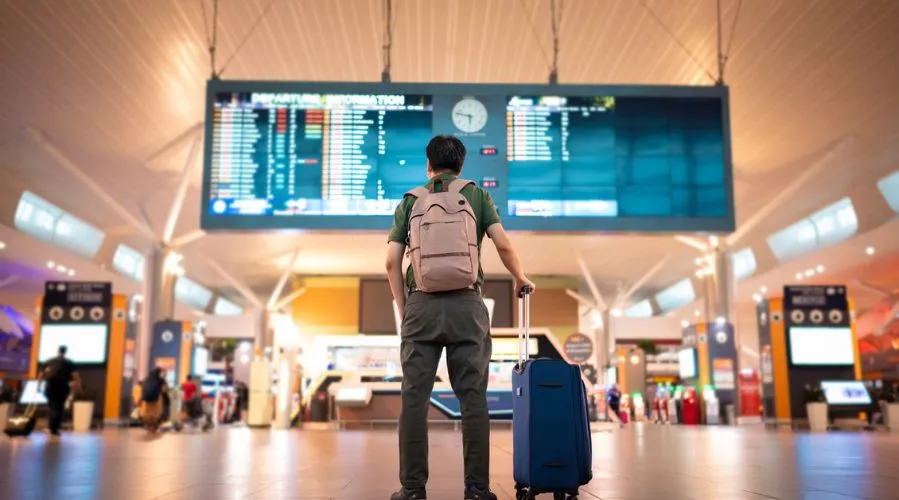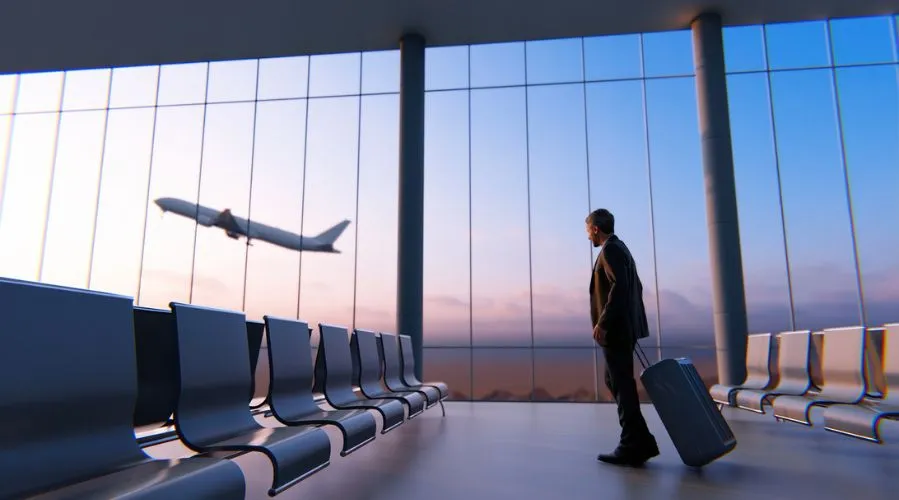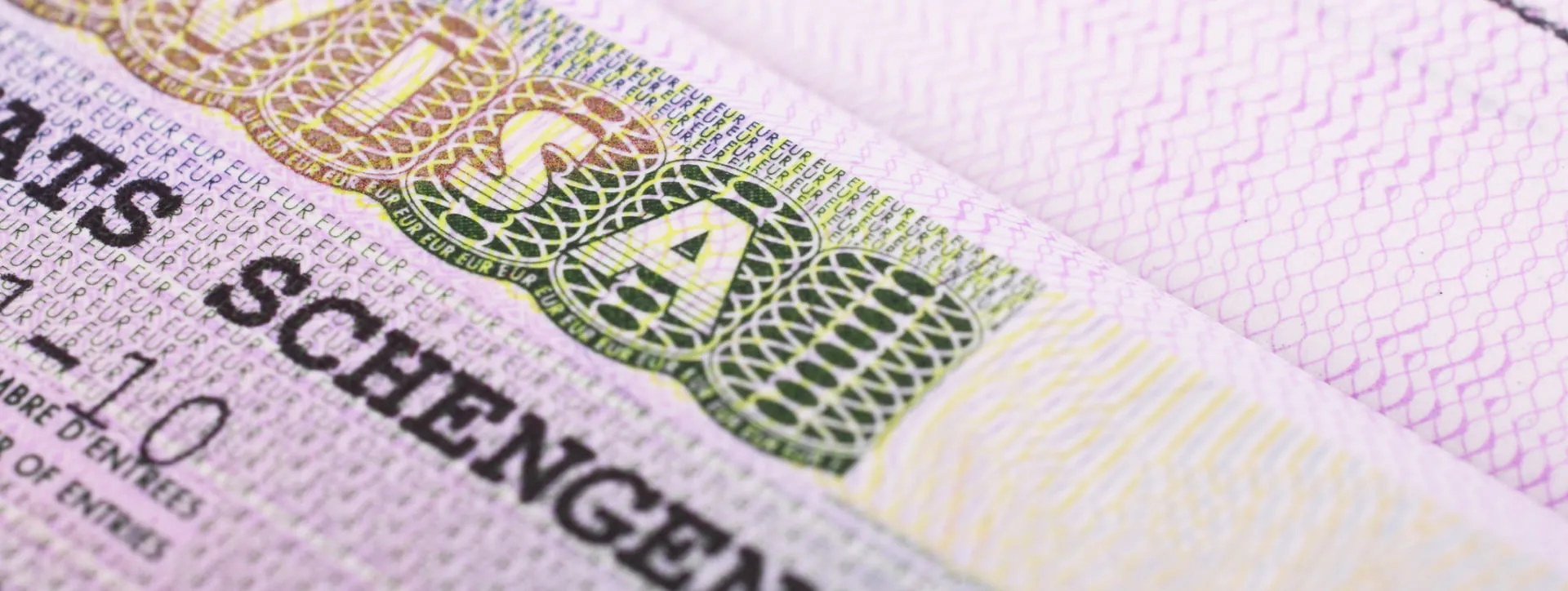NAME: Kurt Hambadda
DATE: 19/05/2025
No matter where in Europe you’re headed, you’ll likely need some cash when you get there. And with not one but a staggering 27 currencies throughout the continent, you do have a few options of what exactly that cash is. However, to even get to Europe, most non-EU travelers will first also need a Schengen visa. And one of the trickiest (and often least understood) requirements for being granted that visa is — you guessed it — proving you’ve got enough money for your trip (regardless of the currency).
That's where what’s known as your "means of subsistence" comes in. And, fortunately, Schengen travel pros AXA have all you need to know about exactly what that means below.
- What are “means of subsistence” for a Schengen visa?
- Who needs to prove means of subsistence to travel to Europe?
- How can I prove my means of subsistence for a Schengen visa?
- How much money do I need for a Schengen Visa?
- What if I don’t have enough money when applying for a Schengen visa?
- How can AXA help?
What are the “means of subsistence” for a Schengen visa?
Be it in Europe or anywhere else, the phrase “means of subsistence” — in simple terms — means money to cover your day-to-day expenses (such as accommodation, transportation, food, and so on).
When it comes to travel to Europe, proof of means of subsistence — aka proof of sufficient funds, financial means of support, etc. — is one of the most common primary requirements for being granted a Schengen visa.
Proving sufficient means of subsistence is basically a way for travelers to demonstrate to the Schengen countries they plan to visit that they can financially support themselves when there.
The idea behind these means remains the same across the board. However, the specific amounts required will vary from country to country (but don’t worry — a bit more on that below).
Why is it important to prove financial means for a Schengen visa?
The main reason this requirement exists is that the Schengen countries you’re thinking about visiting want to ensure that you won’t become a financial liability. In other words, they need proof that you can take care of yourself without relying on public funds.
Your proof of means of subsistence is also a way for Schengen authorities to reduce the risk of overstays, illegal work, or visa applicants falling through the cracks of the system once they arrive.
So whether you’re visiting for tourism, business, or study, you have to show that you can cover your life abroad for the entire duration of your stay. Without this, your visa application will almost certainly be denied.
Who needs to prove means of subsistence to travel to Europe?
Well, when it comes to the Schengen zone, the rules are pretty clear: anyone applying for a Schengen visa — no matter what type of Schengen visa that is — must prove they have enough financial means for their trip. And this applies to millions of non-EU nationals from over a hundred different nations worldwide.
PRO-TIP: Fortunately, AXA can tell you if you need a Schengen visa in no time. And if you do, we can also help you get one with our comprehensive Step-by-step Schengen visa application guide.
IMPORTANT NOTE: But also keep in mind that not all of Europe’s roughly 50 nations belong to the Schengen Area. And each non-Schengen nation has its own entry rules — including financial requirements. So it’s always best to check with the official government website/consulate of the specific country you plan to visit.
PRO-TIP: Meanwhile, if you’re feeling extra geeky — AXA can also help you brush up on the difference between Europe, the European Union, the Schengen Zone, the Euro Zone, and the EEA.
What expenses are covered under means of subsistence for a Schengen visa?
The expenses the means themselves refer to typically include:
- Accommodation (hotel, Airbnb, proof of hosting, etc.)
- Food and daily necessities
- Public or private transport within the Schengen Area
- Medical care (although travel insurance is also a requirement — but more on that below too!)
IMPORTANT NOTE: Flights to and from Europe do not count as means of subsistence.
Do I need to prove financial means to get an ETIAS?
Not necessarily. Europe’s very-long-awaited travel requirement known as ETIAS is for visa-exempt travelers — such as Canadian, UK, and U.S. citizens, for example. Which means it’s wholly separate from the Schengen visa application process (and its requirements).
IMPORTANT NOTE: However, while you won’t necessarily need to prove means of subsistence to get ETIAS authorization, you may be asked to show proof of funds at the border. So, again, make sure to double-check with the specific country you’re visiting (i.e., don’t toss your bank statements just yet).
How can I prove my means of subsistence for a Schengen visa?
The most accepted proof is recent bank statements from the last three months. And they must clearly show your name, current address, account balance, and regular financial activity. But you sometimes have other options too.
What documents are typically required to demonstrate sufficient funds?
Bank statements are definitely the most common requirement from Schengen consulates — so those are your safest bet. But you might also be able to submit (at the very least — as supporting documents):
- Payslips from your employer
- A signed employment letter confirming salary and contract length
- Proof of pension or scholarship
- Income tax returns
- A letter from your sponsor with their financial proof (i.e., if someone else is covering your trip)
IMPORTANT NOTE: Meanwhile, travel money cards, prepaid cards, and cash are generally not accepted as valid proof of means of subsistence.
How much money do I need for a Schengen Visa?
Well, on top of the Schengen visa costs themselves (which are universal), the amount of cash you’ll need for Europe varies depending on the country, length of stay, accommodation type, and whether you’re traveling solo or in a group. In other words, there’s no single magic number.
But don’t worry — the embassy/consulate of your destination country* should be able to tell you the specific amounts.
*PRO-TIP: And, fortunately, the European Union’s official website has links to all Schengen diplomatic missions around the world — so ask away!
What are the minimum daily amounts for different Schengen states?
AXA, meanwhile, can gladly give you a general idea. Most countries will have a set “x-euro-per-day” requirement for visitors. Some, however, differentiate based on accommodation (hotel vs. host), trip length, and so on.
So here are some key examples as of mid-2025 — according to their respective official government and consulate websites.
What is the minimum daily amount required for France?
According to the French Government’s official France-Visas. page:
- €120/day if you don’t have prepaid accommodation
- €65/day with a hotel reservation
- €32.25/day if staying with a private individual (and can prove accommodation)
What is the minimum daily amount required for Germany?
-Around €45/day (but there’s no fixed amount — so check with your specific consulate)
What is the minimum daily amount required for Spain?
According to the Spanish Consulate in San Francisco, USA:
- Approx. 108€/day
What is the minimum daily amount required for Portugal?
According to the Portuguese Ministry of Foreign Affairs:
- €40/day (plus €75 fixed amount each entry)
What is the minimum daily amount required for Italy?
According to Italy’s Ministry of the Interior:
- 1–5 days: €269.60 (solo); €212.81/person (in a group)
- 6–10 days: €44.93/day (solo); €26.33/day/person (group)
- 11–20 days: €51.64 + €36.67/day (solo); €25.82 + €22.21/day (group)
- 20+ days: €206.58 + €27.89/day (solo); €118.79 + €17.04/day (group)
What is the minimum daily amount required for Switzerland?
According to the Swiss State Secretariat for Migration (SEM):
- CHF* 100/day (i.e., approx. €102–105/day — depending on the exchange rate)
*CHF= Swiss Francs.
Does the length and purpose of your stay impact the required funds?
Usually, yes. For example, a short 5-day tourist visit will generally require far less than, say, a 90-day language course.
Students in particular, in fact, may often need to show a lump sum. Whereas tourists are usually assessed per day.
IMPORTANT REMINDER: But, again, it will all ultimately depend on your specific destination (and its diplomatic missions’ latest specifications). So always double-check with the embassy/consulate/visa application center of your destination country before applying — as Schengen countries’ individual requirements tend to change often.
What if I don’t have enough money when applying for a Schengen visa?
If you don't have enough money when applying for a Schengen visa, you may be able to provide things like proof of prepaid accommodation — or your latest bank statements confirming that you will have access to funds during your stay.
One slightly more viable option is to provide a sponsorship letter from someone who will cover your expenses. This sponsor will then, in turn, need to submit proof of their financial stability (bank statements, pay slips, etc.).
PRO-TIP: And AXA can tell you all about a letter of sponsorship for a Schengen visa too!
What happens if I run out of money during my stay in the Schengen Area?
Well, it’s best not to. Because if you do, you risk facing fines, deportation, and/or even being banned from re-entering the Schengen Area.
So either ensure you have enough funds for the entire duration of your trip — or arrange for some sort of financial support before traveling.
FINAL PRO-TIP: And in case of financial emergencies like lost documents, missed flights, or health issues — a solid Schengen travel insurance plan might just do the trick too!
How can AXA help?
And that’s where we come in. Because while AXA can’t necessarily help you out with the means of subsistence themselves (sorry!), we do have your back with another one of the major requirements for a Schengen visa.
Namely — the mandatory Schengen travel insurance you’ll also need to provide during your application.
Fortunately, all our plans meet Schengen visa requirements. And they’re also affordable, easy to purchase, and top-quality — providing a whole array of services, support, and coverage in Europe (and beyond).
And financially speaking, with AXA, not only are you and your family safe from any expensive medical or other mishaps — but you’re likely to save a pretty penny (or whatever the case may be) during your European adventure too!
So before you get your calculator out and start sifting through those bank statements, make sure to
compare AXA’s different benefits and get an AXA quote too (it’s free!).
Ultimately, a proper AXA plan means that your Schengen journey is safe and stress-free. But it also means that your means of subsistence are more likely to stay sufficient too — both while applying for your Schengen visa and throughout your entire stay in Europe. So click around!
RELATED ARTICLES:
FAQ
Are cash and travel money cards acceptable as proof of means of subsistence?
In some cases, cash and travel money cards may be accepted — but they are generally not preferred. It’s best to provide bank statements, pay slips, or other official financial documents as proof. Always check with the specific consulate for their latest requirements.
Does the required amount vary by country?
Yes, the required amount for means of subsistence varies by Schengen country — and each country sets its own financial requirements.
Can I work to support myself while in the Schengen Area?
No, not on a Schengen visa. In other words, you must show you have sufficient funds for your entire stay when you apply — or rely on a sponsor for financial support. But AXA can also tell you all about a work visa for the Schengen if you like (but keep in mind that that’s not a Schengen visa).
AXA already looks after millions of people around the world
With our travel insurance we can take great care of you too
AXA Schengen's Travel Insurances

AXA Schengen Basic
AXA Schengen Basic is perfect to obtain your Schengen visa. This travel insurance meets all the requirements demanded, covers you in all the countries of the Schengen Area as well as 4 European microstates (Andorra, Vatican City, Monaco and San Marino).

AXA Schengen Essential
AXA Essential is perfect to obtain your Schengen visa. It provides coverage in all the Schengen countries + the European microstates + all the EU countries (including UK, Cyprus and the Republic of Ireland). And you get additional guarantees compared to AXA Schengen Basic.

AXA Schengen Annual
AXA Annual is perfect to obtain your Schengen visa. This annual travel insurance is ideal for those who often travel to Europe as well as multiple-entry Schengen visa holders. You get the same guarantees as AXA Schengen Annual for different countries during 90 days.


